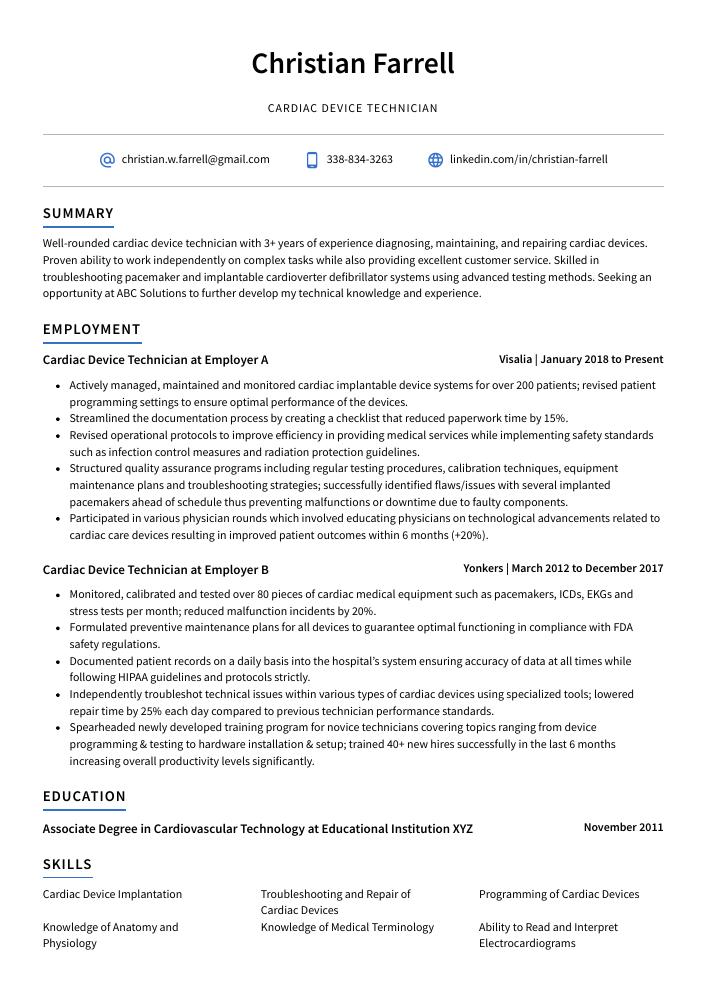Cardiac Device Technician Resume Guide
Cardiac Device Technicians are responsible for installing, maintaining, and troubleshooting pacemakers and other implantable devices. They work closely with patients to ensure that the device is functioning properly and provide education on how to use these medical implants.
Your knowledge of cardiac devices is unparalleled, and any medical organization would be lucky to have you. But they don’t know who you are yet. To make sure recruiters take notice of your credentials, craft a resume that stands out from the rest.
This guide will walk you through the entire process of creating a top-notch resume. We first show you a complete example and then break down what each resume section should look like.
Table of Contents
The guide is divided into sections for your convenience. You can read it from beginning to end or use the table of contents below to jump to a specific part.
Cardiac Device Technician Resume Sample
Christian Farrell
Cardiac Device Technician
[email protected]
338-834-3263
linkedin.com/in/christian-farrell
Summary
Well-rounded cardiac device technician with 3+ years of experience diagnosing, maintaining, and repairing cardiac devices. Proven ability to work independently on complex tasks while also providing excellent customer service. Skilled in troubleshooting pacemaker and implantable cardioverter defibrillator systems using advanced testing methods. Seeking an opportunity at ABC Solutions to further develop my technical knowledge and experience.
Experience
Cardiac Device Technician, Employer A
Visalia, Jan 2018 – Present
- Actively managed, maintained and monitored cardiac implantable device systems for over 200 patients; revised patient programming settings to ensure optimal performance of the devices.
- Streamlined the documentation process by creating a checklist that reduced paperwork time by 15%.
- Revised operational protocols to improve efficiency in providing medical services while implementing safety standards such as infection control measures and radiation protection guidelines.
- Structured quality assurance programs including regular testing procedures, calibration techniques, equipment maintenance plans and troubleshooting strategies; successfully identified flaws/issues with several implanted pacemakers ahead of schedule thus preventing malfunctions or downtime due to faulty components.
- Participated in various physician rounds which involved educating physicians on technological advancements related to cardiac care devices resulting in improved patient outcomes within 6 months (+20%).
Cardiac Device Technician, Employer B
Yonkers, Mar 2012 – Dec 2017
- Monitored, calibrated and tested over 80 pieces of cardiac medical equipment such as pacemakers, ICDs, EKGs and stress tests per month; reduced malfunction incidents by 20%.
- Formulated preventive maintenance plans for all devices to guarantee optimal functioning in compliance with FDA safety regulations.
- Documented patient records on a daily basis into the hospital’s system ensuring accuracy of data at all times while following HIPAA guidelines and protocols strictly.
- Independently troubleshot technical issues within various types of cardiac devices using specialized tools; lowered repair time by 25% each day compared to previous technician performance standards.
- Spearheaded newly developed training program for novice technicians covering topics ranging from device programming & testing to hardware installation & setup; trained 40+ new hires successfully in the last 6 months increasing overall productivity levels significantly.
Skills
- Cardiac Device Implantation
- Troubleshooting and Repair of Cardiac Devices
- Programming of Cardiac Devices
- Knowledge of Anatomy and Physiology
- Knowledge of Medical Terminology
- Ability to Read and Interpret Electrocardiograms
- Ability to Use Specialized Medical Equipment
- Ability to Work With a Variety of Cardiac Device Manufacturers
- Knowledge of Regulatory Standards
Education
Associate Degree in Cardiovascular Technology
Educational Institution XYZ
Nov 2011
Certifications
Certified Cardiac Device Technician
International Board of Heart Rhythm Examin
May 2017
1. Summary / Objective
A resume summary/objective is a great way to introduce yourself and your skills as a cardiac device technician. In this section, you can highlight the most important aspects of your experience and qualifications, such as the medical certifications you have obtained, any specialized training or courses you’ve taken related to cardiac devices, and how many years of experience in this field that you possess.
Below are some resume summary examples:
Amicable and knowledgeable cardiac device technician with 5+ years of experience maintaining and troubleshooting medical equipment to ensure patient safety. Certifications include Basic Cardiac Life Support, Advanced Cardiac Life Support, and Defibrillator/Pacemaker Training. Seeking a position at ABC Medical Center that will allow me to utilize my technical skills in the field of cardiac care for improved patient outcomes.
Seasoned cardiac device technician with 10+ years of experience in the medical field. Specializing in cardiac pacemakers, defibrillators, and other implantable devices. Highly experienced in performing troubleshooting procedures as well as patient education on implanted devices. At XYZ Hospital successfully installed over 500 pacemaker implants for patients suffering from atrial fibrillation or bradycardia related issues.
Reliable cardiac device technician with over 4 years of experience installing and maintaining medical devices for patient care. At XYZ Hospital, successfully managed the installation and maintenance of cardiac monitoring equipment to ensure optimal performance in a timely manner. Seeking to join ABC Medical Center as their next cardiac device technician where I can continue to provide excellent service for patients.
Passionate cardiac device technician with 5+ years of experience in implantable and external cardiac devices, including pacemakers and defibrillators. Experienced in all facets of the job, from patient assessment to device troubleshooting. At XYZ Hospital, successfully led a team that achieved 99% accuracy for 500 implanted pacemaker units over 4 months. Received an award for improving performance metrics by 15%.
Determined and reliable cardiac device technician with 5+ years of experience providing maintenance and technical support for a wide range of cardiovascular equipment. Proven expertise in troubleshooting, calibration, installation, and repair services. Seeking to join ABC Medical Center as Cardiac Device Technician where I can provide the highest level of care to patients while utilizing my knowledge and skills.
Accomplished cardiac device technician with 5+ years of experience in the healthcare field. Skilled at troubleshooting and programming pacemakers, defibrillators, and other cardiac devices. At XYZ Hospital, trained new technicians on how to use software systems for efficient patient care. Received customer service awards for consistently providing excellent support to patients during their treatments.
Hard-working cardiac device technician with 3+ years of experience in the medical field. Skilled at troubleshooting, repairing and installing cardiac devices such as pacemakers and defibrillators. Certified by ABC Medical Device Manufacturers Association for servicing high-end equipment. Successfully completed over 500 installation/repair jobs without any customer complaints or product returns.
Professional Cardiac Device Technician with 5+ years of experience in the healthcare industry. Skilled at performing routine and complex device implantations, troubleshooting cardiac devices, and providing patient education on proper use of medical equipment. Seeking to join ABC Medical’s team as a Cardiac Device Technician to provide quality care for patients.
2. Experience / Employment
In the experience section, you’ll provide details on your employment history. This should be written in reverse chronological order, with the most recent job listed first.
When describing what you did for each role, use bullet points to make it easier for the reader to digest the information quickly. You want to focus on providing detail about what you did and any quantifiable results that were achieved.
For example, instead of saying “Maintained cardiac devices,” you could say “Performed preventative maintenance and repairs on over 100 cardiac devices per month; reduced device failure rate by 25%.”
To write effective bullet points, begin with a strong verb or adverb. Industry specific verbs to use are:
- Installed
- Monitored
- Calibrated
- Troubleshot
- Repaired
- Inspected
- Programmed
- Tested
- Adjusted
- Replaced
- Analyzed
- Documented
- Operated
- Upgraded
- Serviced
Other general verbs you can use are:
- Achieved
- Advised
- Assessed
- Compiled
- Coordinated
- Demonstrated
- Developed
- Expedited
- Facilitated
- Formulated
- Improved
- Introduced
- Mentored
- Optimized
- Participated
- Prepared
- Presented
- Reduced
- Reorganized
- Represented
- Revised
- Spearheaded
- Streamlined
- Structured
- Utilized
Below are some example bullet points:
- Introduced new cardiovascular medical protocols and equipment to 15+ cardiology departments in hospitals, resulting in a 20% increase in patient outcomes.
- Improved the accuracy of readings taken from cardiac monitoring devices by 30%, leading to more accurate diagnoses and earlier treatments.
- Utilized specialized software programs such as ECG Pro, Cardiac Suite & Abbott ECHOviewer for calibration and programming pacemakers, defibrillators & other implantable cardioverter-defibrillator (ICD) systems; reduced device failure rate by 10%.
- Programmed over 250 ICDs with specific settings tailored for each patient’s needs; coordinated with physicians/nurses about follow-up visits & monitored patients’ progress post-surgery or procedure.
- Consistently maintained all records related to devices used on site according to hospital regulations, ensuring that all relevant information was readily available when needed for legal purposes or insurance claims processing.
- Analyzed and assessed over 200 cardiac devices such as pacemakers, defibrillators and loop recorders per month to ensure accuracy of performance.
- Calibrated and adjusted equipment settings based on manufacturer’s specifications while troubleshooting any abnormalities in the device’s functioning; reduced repair time by 25%.
- Diligently monitored patient data using specialized software programs, updated medical records accordingly and provided technical support when necessary.
- Assessed a wide range of external factors that may have affected patients’ heart rhythms including activity level, lifestyle choices & diet habits; led to a 20% decrease in repeat visits for adjustment purposes within 3 months.
- Troubleshot complex issues with malfunctioning equipment systems quickly and effectively, reducing downtime due to maintenance requirements by 10%.
- Repaired over 500 cardiac devices, including pacemakers and defibrillators, to ensure that patients received the highest quality of care.
- Advised nursing staff on proper device maintenance and troubleshooting methods; reduced call-outs by 15% in the last quarter.
- Mentored a team of 4 junior technicians while providing technical support across all areas of device repairs and installation processes; completed 25+ successful projects within budgeted timelines.
- Developed new diagnostic procedures for improved accuracy when testing all types of cardiac monitoring systems; increased detection rates by 17%.
- Reliably managed inventory control system with 90% accuracy which enabled better cost management throughout the department’s operations.
- Adjusted and calibrated over 200 cardiac devices such as pacemakers and defibrillators for optimal performance, ensuring patient safety and satisfaction.
- Prepared detailed reports on the functionality of each device tested; compiled data to track trends in malfunctions and successfully identified potential defects within a 3-month period.
- Resourcefully developed an innovative method of testing that expedited diagnosis time by 25%, while maintaining accuracy levels above 98%.
- Trained 8 new technicians on how to use diagnostic tools properly while adhering to industry standards; increased operational efficiency by 35% after implementation of their training program.
- Utilized problem solving strategies to troubleshoot complex issues related to cardiac devices, leading up to 10 successful repairs per day with minimal disruption times across all patients’ appointments.
- Installed and programmed over 200 pacemakers, implantable cardioverter defibrillators (ICDs) and other cardiac devices for 250+ patients; achieved a 5% reduction in device-related complications.
- Represented the patient’s best interests when working with cardiologists to ensure proper functioning of installed devices; reduced overall healthcare costs by 10%.
- Achieved 100% accuracy while continuously monitoring vital signs to detect any changes or irregularities in heart rate and rhythm during hospital rounds.
- Demonstrated excellent technical skills when troubleshooting issues related to malfunctioning implants involving electrical components, batteries, leads and software programs within 2 hours on average per case.
- Meticulously documented all procedures conducted according to protocol standards set by the American College of Cardiology (ACC); improved audit compliance score from 90% to 95%.
- Coordinated the installation, maintenance and repair of over 600 cardiac devices in a timely manner; reduced down-time for patient care by 20%.
- Serviced pacemakers, defibrillators and other life support equipment utilizing specialized tools while ensuring compliance with all safety procedures.
- Effectively troubleshot issues on the spot to resolve device malfunctions within 2 hours or less on average; lowered unplanned service call rates by 12%.
- Inspected various components of different types of medical instruments such as cables, transducers & batteries according to manufacturer specifications prior to release into circulation.
- Optimized software configurations across multiple models of heart monitors based on customer requirements, resulting in an increase in overall product satisfaction ratings by 15%.
- Tested and calibrated over 200 cardiac devices per week, ensuring all met safety and performance standards; reduced the number of device malfunctions by 23%.
- Operated specialized equipment to install, troubleshoot and repair cardiac pacemakers, implantable cardioverter-defibrillators (ICDs) as well as other related medical instrumentation.
- Reduced patient wait times for repairs & replacements by 30%, through quick problem resolution and efficient scheduling techniques.
- Competently assisted with postoperative care for patients who had received a new or adjusted device installed in their body; proactively identified potential issues that required attention from surgeons or physicians on 5 occasions during the year resulting in improved outcomes for those individuals.
- Facilitated preventative maintenance programs across multiple facilities to ensure optimal functioning of all devices; extended average lifespan of ICDs from 4 years to 6 years due to thorough upkeep efforts each month.
- Replaced over 200 cardiac devices such as pacemakers, defibrillators and monitors in hospitals, nursing homes and private residences; reduced downtime by 30%.
- Presented new device features to over 100 physicians on a quarterly basis, helping them maximize their patients’ outcomes while increasing customer satisfaction levels.
- Reorganized the department’s supply inventory system for maximum efficiency; lowered costs by 15% within one year of implementation.
- Upgraded patient monitoring systems with latest technology to ensure accurate surveillance of vital signs during medical interventions; improved data accuracy by 45%.
- Successfully trained 10+ technicians on the use of various cardiac implants and equipment according to manufacturer guidelines in order to maintain quality standards across all installations.
3. Skills
Even though two organizations are hiring for the same role, the skillset they want an ideal candidate to possess could differ significantly. For instance, one may be on the lookout for an individual with experience in implanting pacemakers, while another may be searching for someone who can troubleshoot issues with defibrillators.
That is why it is important to tailor the skills section of your resume according to each job you are applying for – this will help ensure that applicant tracking systems (computer programs used by many employers to scan resumes) recognize the keywords associated with a particular role and pass on your application accordingly.
In addition, you should also discuss these skills in more detail throughout other sections of your resume.
Below is a list of common skills & terms:
- Ability to Read and Interpret Electrocardiograms
- Ability to Use Specialized Medical Equipment
- Ability to Work With a Variety of Cardiac Device Manufacturers
- Ability to Work in a Fast-paced Environment
- Cardiac Device Implantation
- Knowledge of Anatomy and Physiology
- Knowledge of Medical Terminology
- Knowledge of Regulatory Standards
- Programming of Cardiac Devices
- Troubleshooting and Repair of Cardiac Devices
4. Education
Adding an education section to your resume will depend on how far into your career you are. If you just graduated and have no prior experience, it is important to mention your education below the objective statement. However, if you already have a few years of work experience as a cardiac device technician, including an education section may not be necessary.
If an education section is included in the resume, try to list courses or subjects that are related to the job position of cardiac device technician.
Associate Degree in Cardiovascular Technology
Educational Institution XYZ
Nov 2011
5. Certifications
Certifications are an important way to demonstrate your knowledge and expertise in a particular field. They can be used to show potential employers that you have the necessary skills for the job, as well as any additional qualifications or certifications that are relevant.
Including certifications on your resume is a great way to make yourself stand out from other applicants and give hiring managers confidence in your abilities. Be sure to list all of the certifications you possess, including their issuing body and date of completion if applicable.
Certified Cardiac Device Technician
International Board of Heart Rhythm Examin
May 2017
6. Contact Info
Your name should be the first thing a reader sees when viewing your resume, so ensure its positioning is prominent. Your phone number should be written in the most commonly used format in your country/city/state, and your email address should be professional.
You can also choose to include a link to your LinkedIn profile, personal website, or other online platforms relevant to your industry.
Finally, name your resume file appropriately to help hiring managers; for Christian Farrell, this would be Christian-Farrell-resume.pdf or Christian-Farrell-resume.docx.
7. Cover Letter
Cover letters are an essential part of the job application process. They give you a chance to show recruiters why you are the best fit for their organization, and what unique skills or experience you can bring to the role.
Cover letters usually consist of 2-4 paragraphs, and it’s important that they be tailored specifically for each position applied for. This helps demonstrate your enthusiasm and commitment to being considered as a potential candidate. Additionally, including relevant examples from previous work experiences is another great way to make yourself stand out amongst other applicants.
Below is an example cover letter:
Dear Katrina,
I am writing to apply for the Cardiac Device Technician position at XYZ Medical Center. With experience in cardiac device implantation, monitoring, and troubleshooting, as well as a strong commitment to providing excellent patient care, I am confident I would be a valuable asset to your team.
In my current role as a Cardiac Device Technician at ABC Medical Center, I provide comprehensive implant and follow-up care for patients with pacemakers and defibrillators. This includes performing device implants, interrogations, and reprogramming; interpreting electrocardiograms (EKGs); conducting transtelephonic monitoring; and providing patient education on proper device use and maintenance. My experience has allowed me to develop strong clinical skills while also honing my ability to effectively communicate with patients of all ages.
Additionally, I have played an active role in improving our department’s processes and procedures. For example, I developed a new protocol for managing post-operative pacemaker infections that reduced infection rates by 50%. In addition, I created an educational handout on common arrhythmias that is now used department-wide when educating patients on their condition. My dedication to continuously improving patient care makes me confident that I would excel in this role at XYZ Medical Center.
Thank you for your time and consideration of my application—I look forward to speaking with you soon about how my skills can benefit your organization. If you have any questions or need additional information from me before then please do not hesitate to contact me at [email address] or [phone number]. Thank you again!
Sincerely,
Christian
Cardiac Device Technician Resume Templates
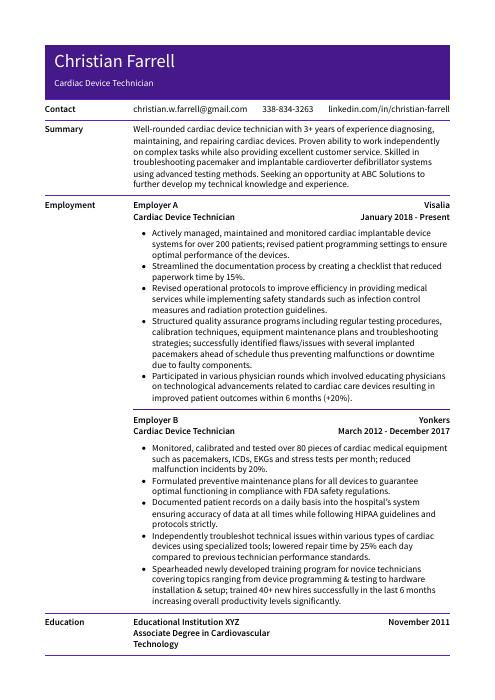 Pika
Pika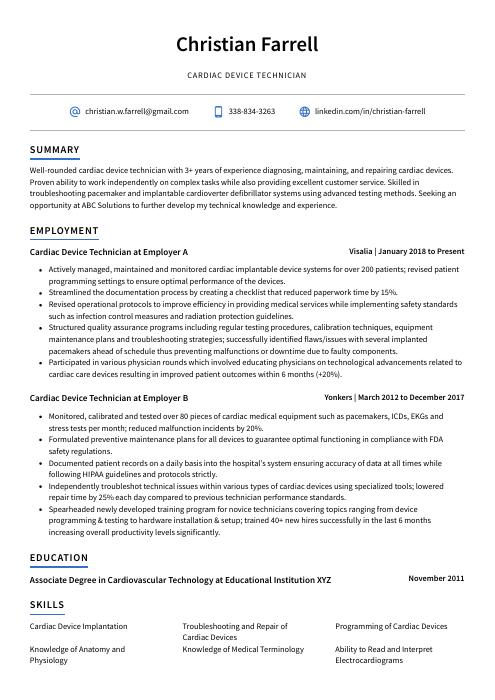 Axolotl
Axolotl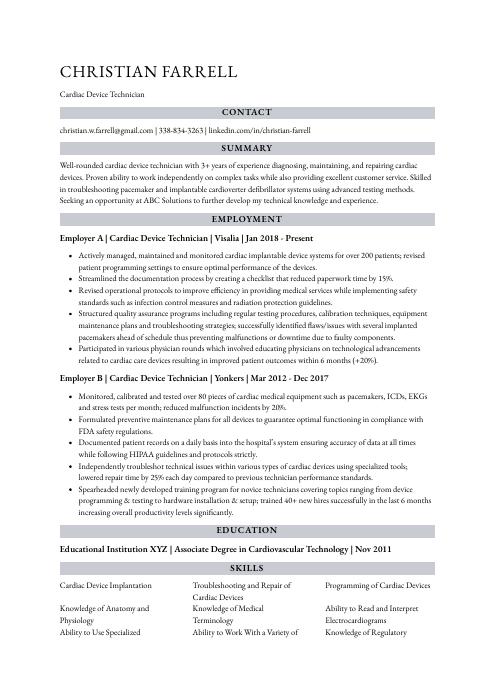 Numbat
Numbat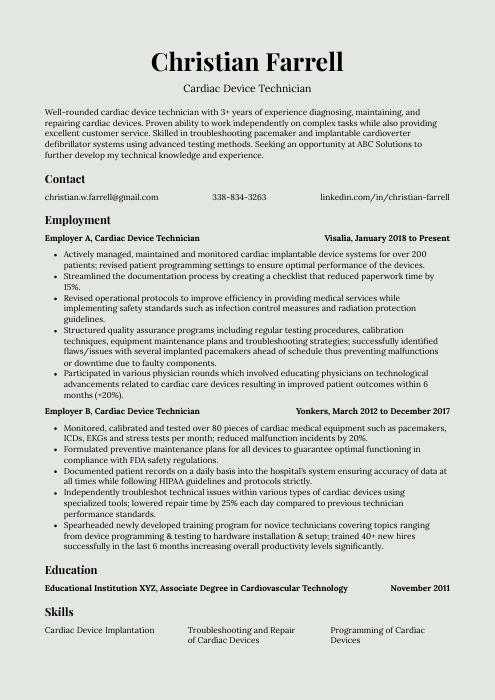 Saola
Saola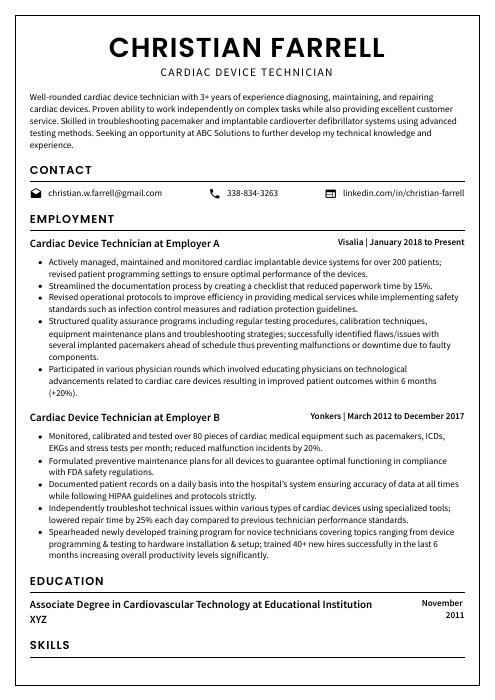 Cormorant
Cormorant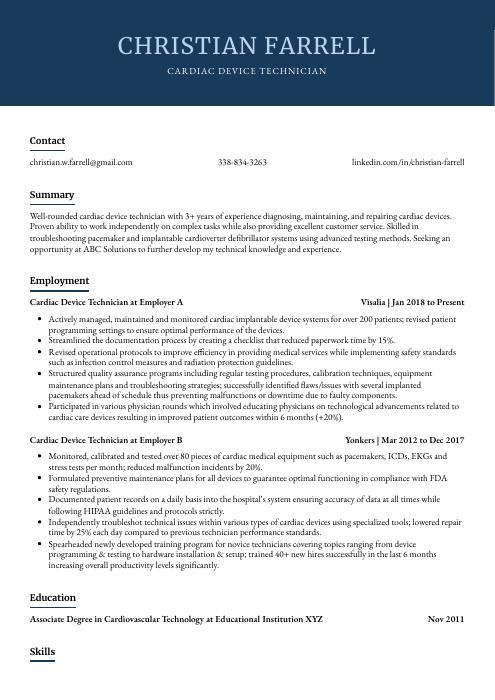 Bonobo
Bonobo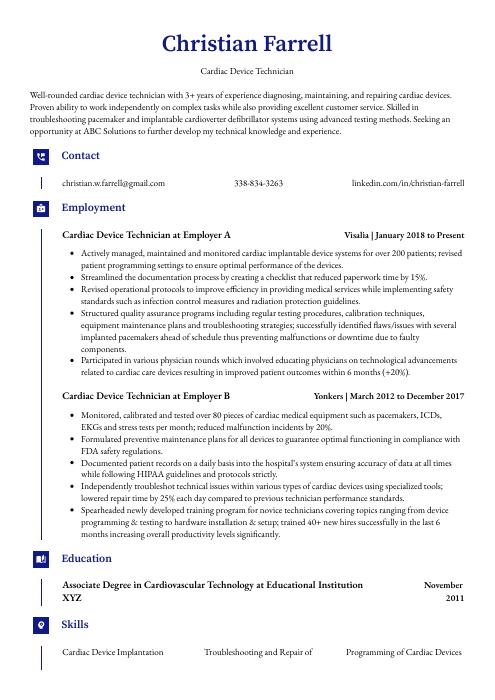 Gharial
Gharial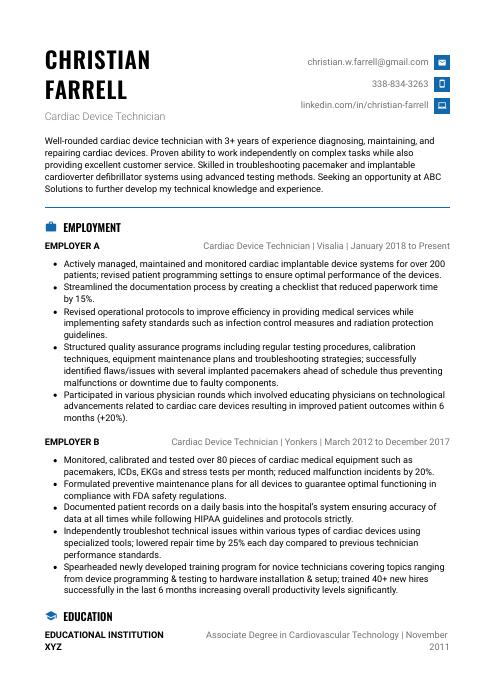 Echidna
Echidna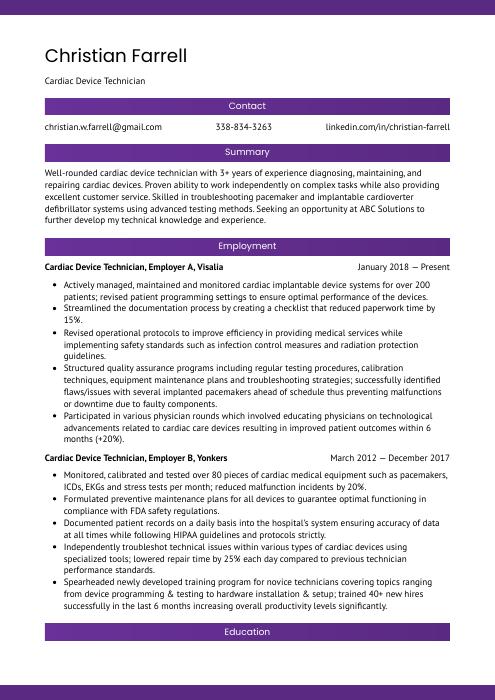 Jerboa
Jerboa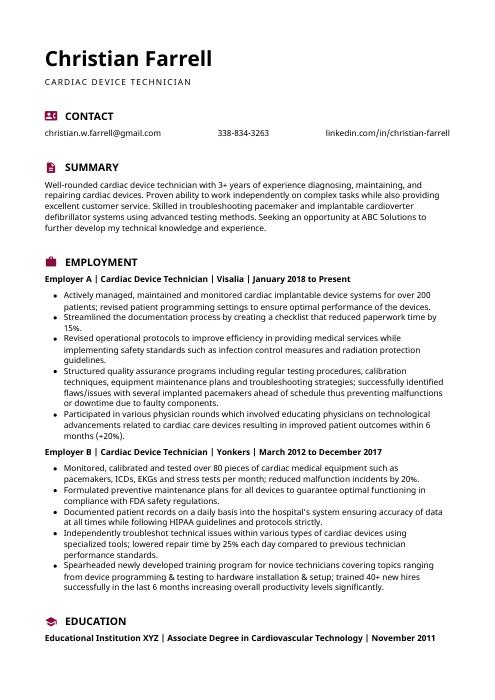 Hoopoe
Hoopoe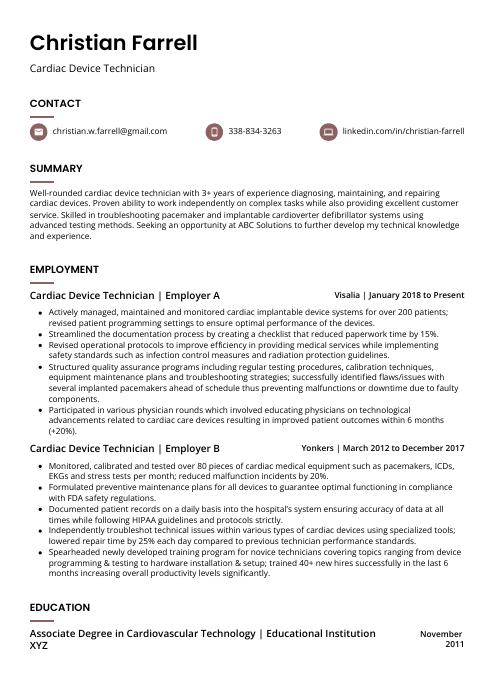 Fossa
Fossa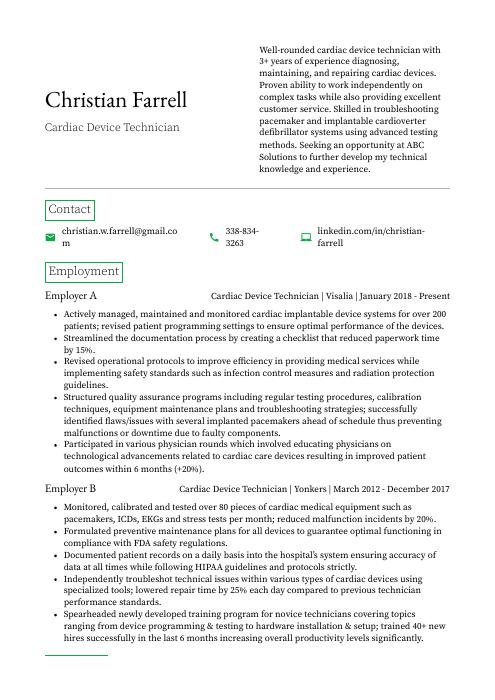 Quokka
Quokka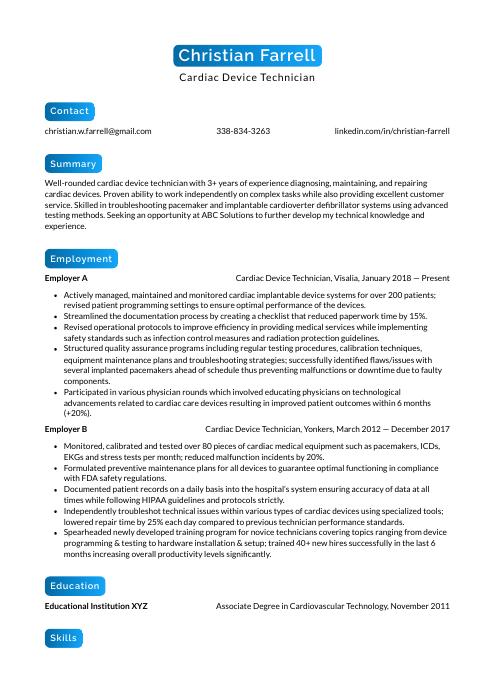 Kinkajou
Kinkajou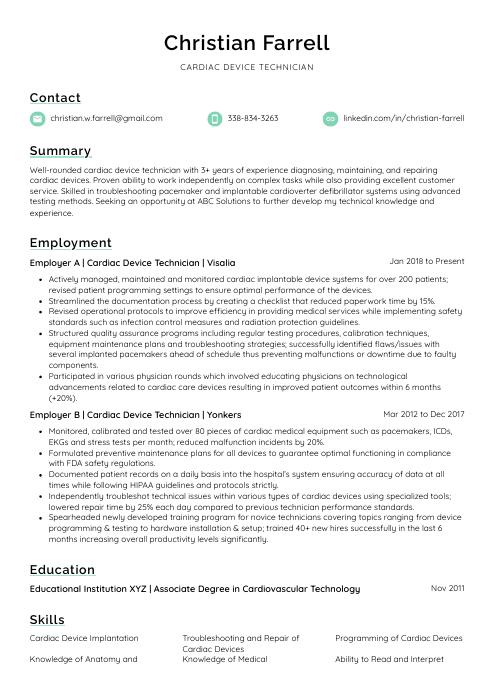 Lorikeet
Lorikeet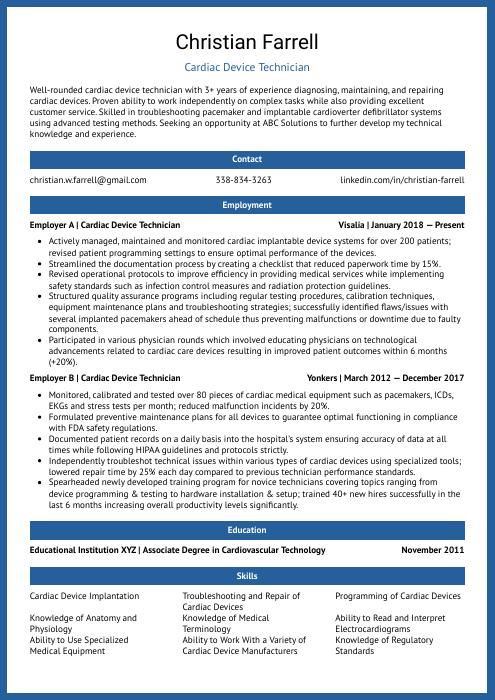 Ocelot
Ocelot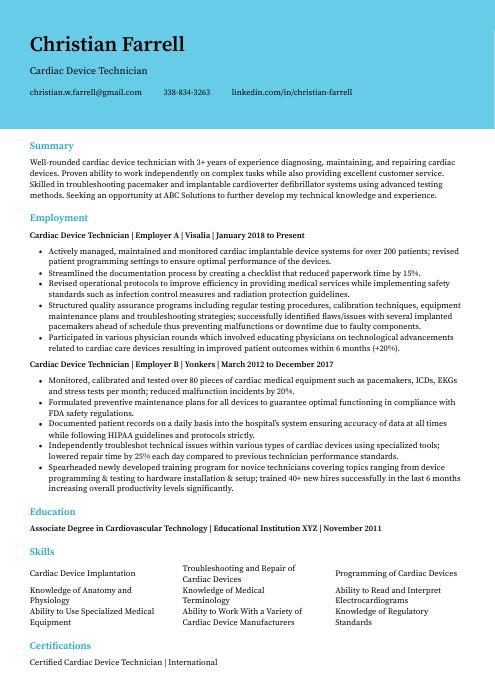 Dugong
Dugong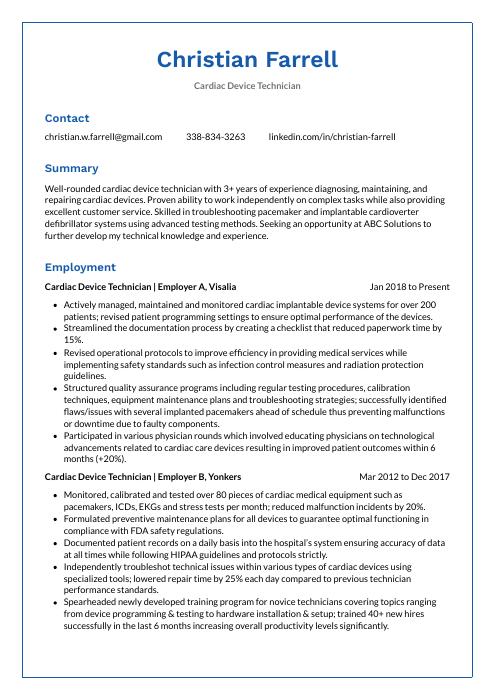 Markhor
Markhor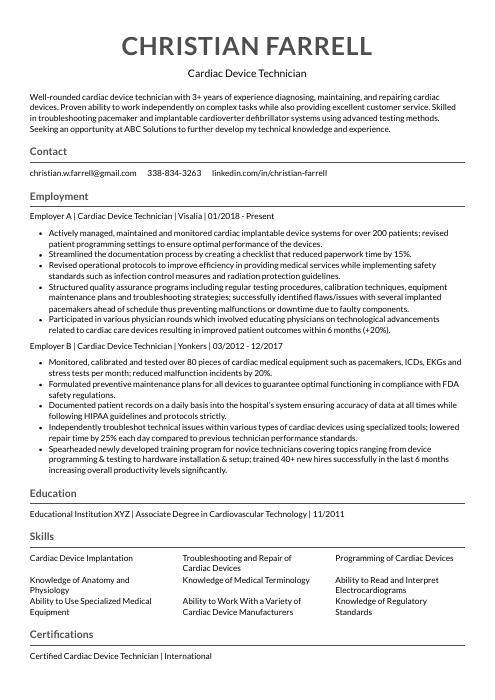 Indri
Indri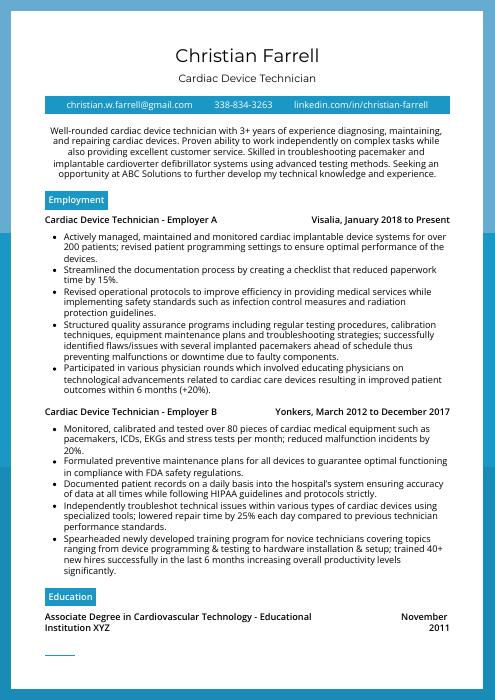 Rhea
Rhea Rezjumei
Rezjumei
